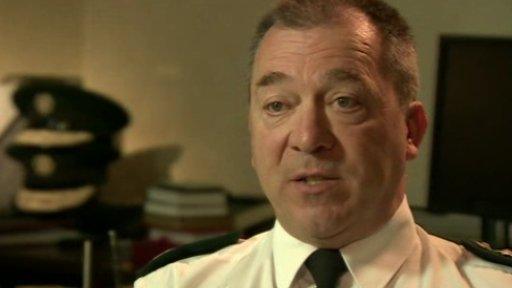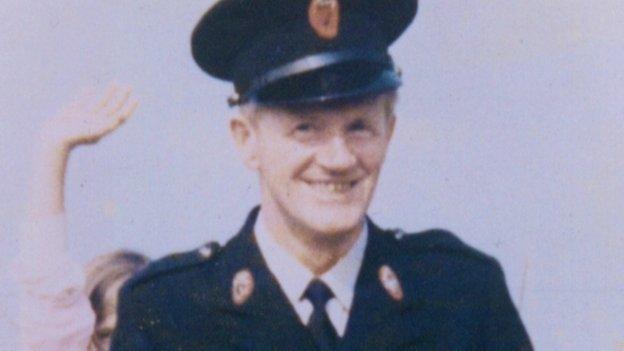Reaction to Matt Baggott suggestion that PSNI not investigate pre-1998 murders
- Published

Matt Baggott said there was a need to "separate the past from the present"
There has been widespread reaction to suggestion by the outgoing chief constable of the Police Service of Northern Ireland that the service should not investigate Troubles-related murders from before the Good Friday Agreement in 1998.
Matt Baggott told the BBC that a new way must be found to deal with such cases.
He made the comments in an interview marking his final day in office. The new chief constable will be the current assistant chief constable, George Hamilton from Bangor, County Down.
Mr Baggott told the BBC that there was a "need to separate the past from the present".
"I think how ever that is done, the PSNI should no longer be accountable for dealing with issues that pre-date the Good Friday Agreement," he said.
He called for a separate authority to deal with historic cases.
Alan McQuillan, former PSNI Assistant Chief Constable
"We mustn't devalue the murders of the past just because it's expensive and difficult to investigate them.
"I think that the fundamental issue here is that in the absence of any political agreement on the past, it's the issue of the resources for police to do it.
"We have a police force here. It's an effective police force and we should use it."
Baroness Nuala O'Loan, former Police Ombudsman
"Putting on a uniform doesn't give you, if you like, a full competence in doing these matters.
"I think that today's report into Sgt Joseph Campbell's death demonstrates why we need an independent system to deal with historic murders.
"History has recorded that there has been a failure to supply information and that there has been obstruction and that there has been an inability in the police service to deal properly and effectively with cases - if they had done so there wouldn't have been a need for all these historic investigations."
Dolores Kelly, SDLP
"The SDLP has always been very clear that dealing with the past must be comprehensive, victim-centred and on a moral and ethical basis.
"Any new unit should have full powers in terms of bringing perpetrators to justice. Some victims have settled for truth only but other victims want both justice and truth.
"The SDLP is fully supportive that there should not be a line drawn under the past, not least because of the needs of victims and survivors but also to learn the lessons of history and to put it into its proper context so that we can all not repeat the mistakes of the past.
Danny Kennedy, Ulster Unionist Party
"We can't have political expedience just because of a political agreement.
"This is deeply personal to a great many people, we have to try and continue to work at it to bring forward a fair and equitable system that is not a one-sided truth commission.
"The UUP are concerned that attempts are being made to put security forces in the dock because they the only ones with evidence and records.
"I think it would be huge mistake to effectively legislate that security forces would have to provide all of the information and simply rely on a lick and a promise from the paramilitary organisations."
Stephen Cooper, Traditional Unionist Voice councillor
"Regarding Troubles-related murders as some sort of special category of murder is one of the chief flaws of the so-called peace process. There is no difference between a murder committed before 1998 and one committed last week.
"Both are equally heinous. Both are morally and ethically wrong. Both leave grieving families and loved ones. Both deserve to be investigated by the police and those responsible brought to justice before the courts.
"The simple truth which needs to be faced up to by the police and the political establishment is that if you cannot investigate bombings and shootings without negative impacting upon the political process then there is something fundamentally rotten at the heart of that political process."
- Published27 June 2014
